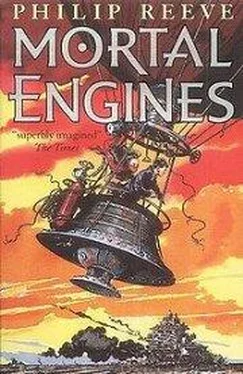Only the Jenny Haniver survived, riding on the fringes of the storm, spinning and pitching as the shock waves battered her, streamers of rainbow light spilling from her rigging and rotor-blades. Her engines had all failed together in that first great pulse of energy, and nothing that Tom knew how to do would make them start again. He slumped down in what was left of the pilot’s seat, weeping, watching helplessly as the night wind carried him further and further from his dying city.
“It’s my fault,” was all he could think to say. “It’s all my fault…”
Hester was watching too, staring back at the place where St Paul’s had been as if she could still see the after-images of Katherine and her father lost in the brightness there. “Oh, Tom, no,” she said. “It was an accident. Something went wrong with their machine. It was Valentine’s fault, and Crome’s. It was the Engineers’ fault for getting the thing to work and my mum’s fault for digging it up in the first place. It was the Ancients’ fault for inventing it. It was Pewsey’s and Gench’s fault for trying to kill you, and Katherine’s for saving my life…”
She sat down beside him, wanting to comfort him but afraid to touch him, while her reflections sneered at her from fractured dials and blades of window-glass, more monstrous than ever in the fluttering glare of MEDUSA. Then she thought, Silly, he came back, didn’t he? He came back for you. Trembling, she put her arms around him and pulled him close, nuzzling the top of his head, shyly kissing away the blood from the fresh wound between his eyebrows, hugging him tight until the dying weapon had spent itself and the first grey daylight crept across the plain.
“It’s all right, Tom,” she kept telling him. “It’s all right…”
London was far away, motionless under banners of smoke. Tom found Miss Fang’s old field glasses and focused them on the city. “ Someone must have survived,” he said, hoping that saying it would make it true. “I bet Mr Pomeroy and Clytie Potts are down there, organizing rescue parties and handing out cups of tea… …” But through the smoke, the steam, the pall of hanging ash he could see nothing, nothing, nothing, and although he swung the binoculars to and fro, growing increasingly desperate, all they showed him were the bony shapes of blackened girders, and the scorched earth littered with torn-off wheels and blazing lakes of fuel and broken tracks lying tangled on themselves like the cast-off skins of enormous snakes.
“Tom?” Hester had been trying the controls, and had found to her surprise that the rudder-levers still worked. The Jenny Haniver responded to her touch, turning this way and that on the wind. She said gently, “Tom, we could try and reach Batmunkh Gompa. We’ll be welcome there. They’ll probably think you’re a hero.”
But Tom shook his head: behind his eyes the 13th Floor Elevator was still spiralling towards Top Tier and Pewsey and Gench were riding their black, silent screams into the fire. He didn’t know what he was, but he knew he was no hero.
“All right,” said Hester, understanding. It took time to get over things sometimes, she knew that. She would be patient with him. She said, “We’ll head for the Black Island. We can repair the Jenny at the air-caravanserai. And then we’ll take the Bird Roads and go somewhere far away. The Hundred Islands, or the Tannhauser Mountains, or the Southern Ice Waste. I don’t mind where. As long as I can come too.”
She knelt beside him, resting her arms on his knees and her head on her arms, and Tom found that he was smiling in spite of himself at her crooked smile. “You aren’t a hero, and I’m not beautiful, and we probably won’t live happily ever after,” she said. “But we’re alive, and together, and we’re going to be all right.”
I am gratefully indebted to Leon Robinson and Brian Mitchell, who provided me with inspiration, encouragement and good ideas, to Mike Grant, who published my early efforts in his late lamented small-press magazine The Heliograph, and to Liz Cross, Kirsten Skidmore and Holly Skeet, without whose patience, enthusiasm and sound advice this book would have ended its days in my fireplace as a lot of very neatly typed kindling.
Philip Reeve










